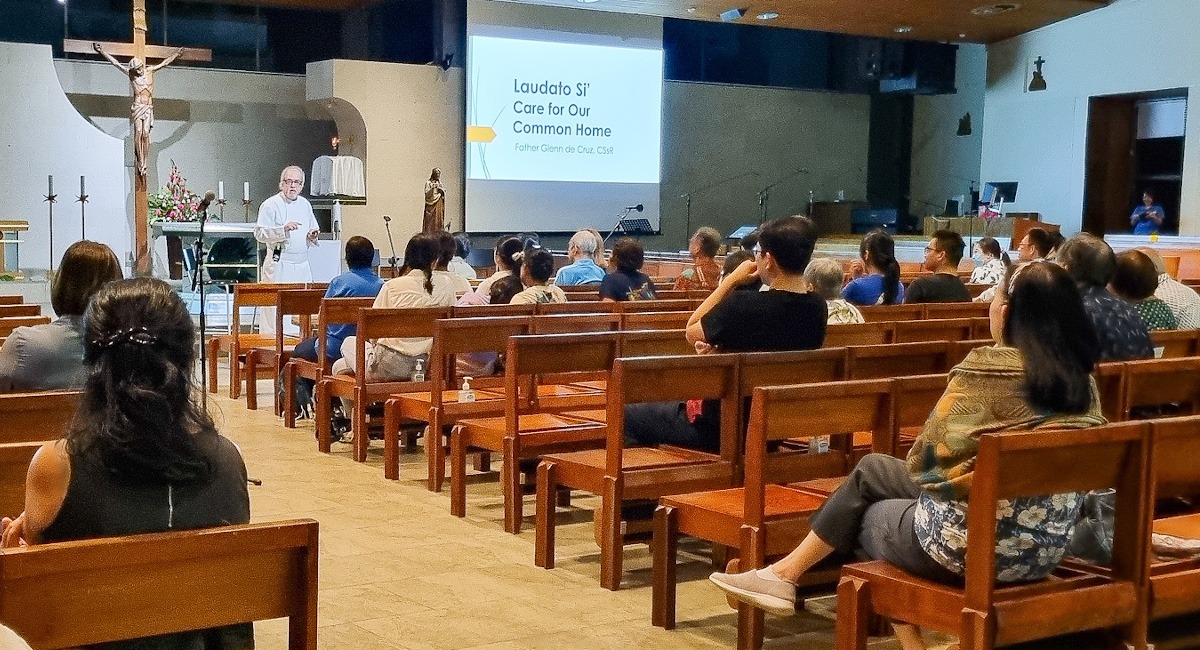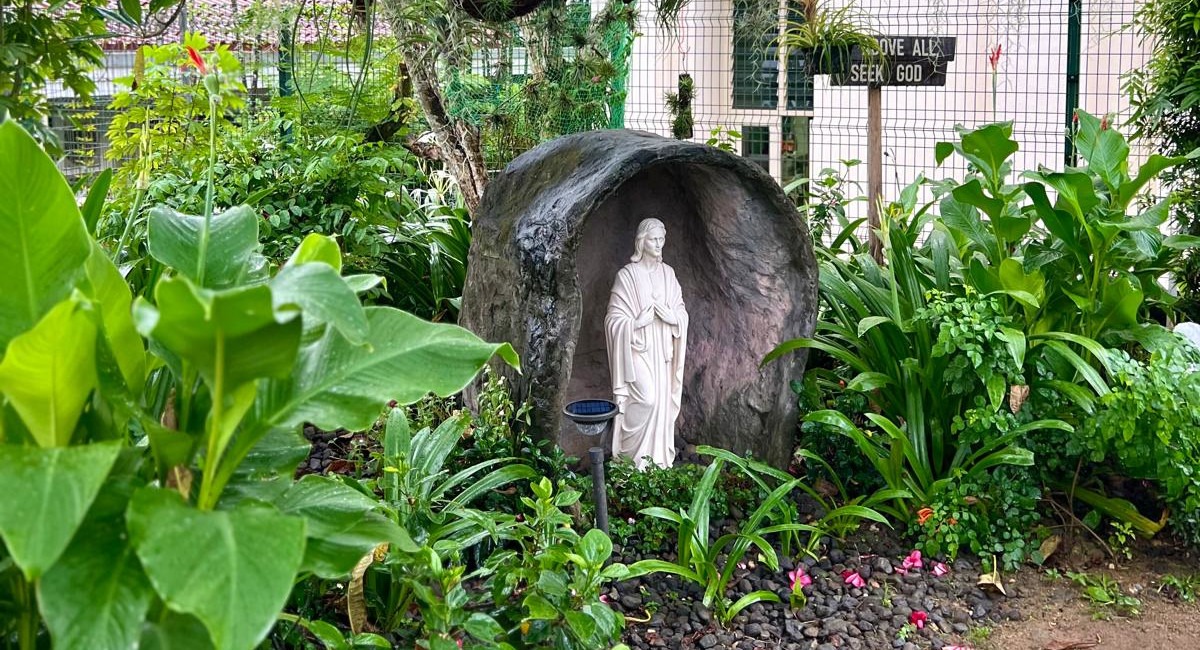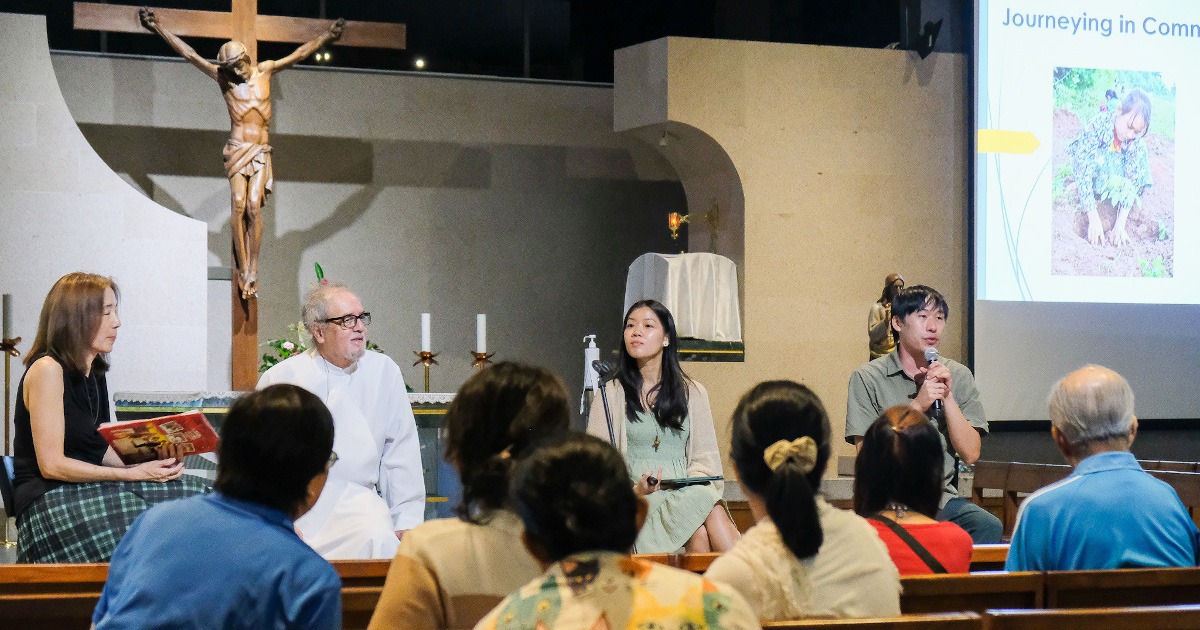
Each year, from 19 to 26 May, the Catholic Church celebrates Laudato sí Week marking the anniversary of Pope Francis’ landmark encyclical. On 23 May, the Church of St Ignatius’ Green Movement Ministry and Jesuit Refugee Service (JRS) Singapore organised a screening and reflection moderated by Caroline Seow on Laudate Deum. The discussion centred around the question: “Voices of the Climate Crisis—how can we respond?”
Dr Johan Rockstrom, Director of the Potsdam Institute, shares that there are serious concerns that not enough is being done to ensure a safe and sustainable future. The world has already warmed 1.2 degrees Celsius with the warmest temperatures this year since the last Ice Age. We are already likely to cross five out of 16 climate tipping points if we exceed 1.5 degrees Celsius; the icecaps of Greenland and a large part of Antarctica will melt completely, with immensely grave consequences for everyone with up to a 30 m rise in sea levels. We are already experiencing heat waves, even here in Singapore.
A spiritual crisis demands a spiritual response
Fr Glenn de Cruz CSsR highlighted the connection between environmental degradation and a broken relationship with creation. “All of Scripture from Genesis to Revelation expresses God’s desire to offer the fullness of life to the world,” he said. In Genesis 1-2: God creates heaven and earth. In Revelation 21-22, God establishes “a new heaven and a new earth”. We have received the gift of creation, yet “we have come to see ourselves as [Sister Earth’s] lords and masters, entitled to plunder her at will (LS 76)”. Sin is the violence we inflict when we forget that we are part of creation, seeing nature as something to be “controlled” (LS76).
He challenged the audience to let go of consumerism and move towards a simpler, less wasteful, and more sustainable lifestyle. But this can only happen if we realise that an environmental crisis is fundamentally a spiritual one. If we want to build a future for future generations, we have to appreciate that our actions or inactions will impact others. We must first recognise that the world is “God’s loving gift” (LS 220) and be aware that each creature reflects something of God (LS 221). Laudate Deum highlights the role of the Eucharist, which “joins heaven and earth; it embraces and penetrates all creation” (LS236) as the source and summit of our communion with God and creation. We need to discern and take personal responsibility for how we live.
Session moderator Caroline Seow with the panellists, Fr Glenn de Cruz CSsR, climate activist Sarah-Ann Tan, and entomologist James Khoo
Youth as stewards of change
Young climate activist Sarah-Ann Tan, USPlanet Founder and IUEC Project Lead, shared that to know and love God is to know and love the wider community and God’s creation. She argued that what is needed is to realise that there are no lasting changes without cultural changes, and cultural change calls for personal changes (LD70).
The youth have an important role in driving cultural change. Their concern about the climate crisis and the vulnerable people who are most impacted by it has spurred growing interest in biodiversity, jobs in sustainability, and advocacy. “Activism is mobilising the thoughts and actions of those around you to challenge those in power to bring about societal change and a better future,” she said.
Sarah-Ann related a success story where young people in Singapore advocated for environmental considerations in a development project. Last December, 35 young people convened for a Long Island Conversation co-organised by The Inter-University Environment Coalition (IUEC), Singapore Youth for Climate Action, Singapore Youth Voices of Biodiversity, and LepakinSG. They discussed and raised the collective desire for effective, just, and equitable climate adaptation and environmental protection with the Urban Redevelopment Authority (URA). The URA recognised the “potential environmental impact of the proposed Long Island project” and assured the youths that “a thorough impact assessment, robust mitigation, and monitoring” would be carried out “with input from stakeholders in the environmental sector”.
Technology alone won’t save us
While technology and innovation play a key role in solving the climate crisis, the panellists cautioned against blind faith in technological solutions. Instead, we need to be reminded that nature is a gift and a glimpse of God’s beauty and goodness. We should care for creation responsibly, with reverence, and not seek to exploit it ruthlessly.
Entomologist, filmmaker, and environmental educator James Khoo reminded us of the interconnectedness of all living things. He shared the crucial role of the smallest of God’s creatures—insects—in biodiversity. We live in a “city in nature” and boast of the “Plant a Million Trees Plan,” yet are we truly in awe of these tiny inhabitants of the earth? From the cluster of male bees (note that male bees do not sting) that need a place to sleep for the night to his discovery of the vagrant butterfly, a local butterfly species that had not been seen in Singapore for nearly four decades, James showed us how little we know about the natural world we live in.

A prayer garden dedicated to the Sacred Heart
A little over a week later, on 1 June, the parish celebrated a Laudato sí Mass and the blessing of the newly completed Sacred Heart Prayer Garden. The Mass and blessing ceremony were led by our parish priest, Fr Colin Tan SJ.
The inspiration for the prayer garden was our collective desire to give the best of our lives—our joys, sorrows, work, and gifts of God’s harvest—to His greater glory. Edward Low from the Gardening Group shared, “We also hope to offer all who come to the garden a safe place to pray, a refuge to seek God’s mercy, and to bask in the goodness of God. While having hope for the future, we also realise the tremendous effort needed on the part of humanity to hear the cry of the earth for ecological justice.”
During the blessing, prayed for the garden to “be a sacred space for all to come and appreciate nature, to find peace and consolation, and to always treasure the earth’s bounty for many generations to come”.
The way forward
The future is truly in our hands. We have received the gift of creation, and we are part of this wonderful world we call home—our common home. Let us do our part in caring for our one true home, which we all share as a human family. As Christina Figueres, architect of the Paris Agreement, said: “Let us use our heads, hearts, and hands to protect nature and the most vulnerable. To regenerate ourselves (review the way we are living) so that we are good stewards of our planetary home and for all future generations.”
In Pope Francis’ words: “May we never yield to the temptation to disregard others, especially those in greatest need, and to look the other way; to form a community composed of brothers and sisters who accept and care for one another. We are called to keep alive a shared dream. Yes, a great dream that has a place for everyone.”
This article was updated on 3 June 2024.







